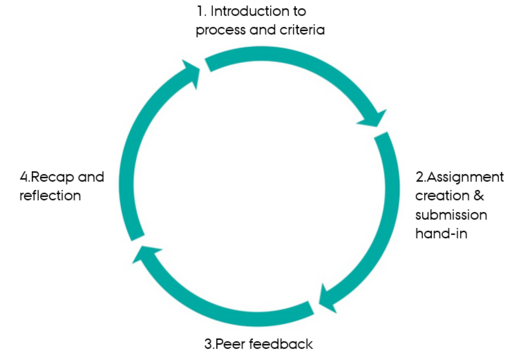Peer feedback increases the amount of feedback for individual students and strengthens the students’ skills in giving and receiving feedback. When students give feedback to others, they improve their own ability to understand and use criteria for assessing their own performance and that of others. When giving feedback, the students must explain and give reasons for their assessment, which means that peer feedback also enhances the students’ academic understanding. By reading and assessing the work of others, students will also get to better understand what makes a good presentation and why.
| Stimulating internal feedback processes | Comparing and actively critiquing other students’ work sparks an internal feedback process in the person giving feedback. This process generates new ideas about the strengths and weaknesses of the feedback giver's own submission while at the same time gaining insights into how other students have solved the proposed assignment. Most of the learning thereby derives from the reviewing process and not only the comments that students receive from their peers (Nicol & McCallum, 2022). |
| Improving self-assessment and –evaluation | By using course-related criteria and having explicit standards in the review process, students gain a better understanding of quality when comparing the different submissions to a set of standards. Not only does the student reflect on the quality of their peer’s work in this process, but this evaluative judgment may also be transferred to the student’s own work (Tai, Ajjawi, Boud, Dawson, & Panadero, 2017). |
| More feedback – capitalizing on peer dialogue | With large classes, it can be difficult for the educator to reach each individual student and have a dialogue about misconceptions or improvements in the assignment. But by involving students as active constructors in the feedback process, each student can receive tailored and specific feedback. Not only do students in peer feedback activities receive feedback from several sources, but students themselves also gain insights into how other students solve the same assignment. Compared to the educator, students are often also able to write comments in a more meaningful and relatable language because they tackle the same assignment (Nicol, 2010). A continuous dialogue about the feedback is also easier to organize, because students themselves can continue discussions on their own or the educator can facilitate a follow-up session for everyone and group students together. |
Peer feedback activities must be designed on the basis of the learning objectives of the course. In other words, the criteria that the feedback must relate to should be identical to the criteria by which the students’ performance is assessed. Before the students embark on their feedback activities, it is important that you prepare them well for giving feedback by discussing the relevant criteria with them.
You may for instance ask your students to give feedback on previous anonymised products in order to practice giving criteria-based feedback. You should also ask your students to give reasons for their feedback and to provide concrete suggestions on how a performance or product might be improved.

In its fundamental essence, peer feedback encompasses two central activities: creating an artifact and giving feedback. However, a proper introduction to the peer feedback process is also needed to successfully engage students in the activity. For the feedback to profoundly resonate, students must reflect and act on the input they receive, and therefore an explicit wrap-up of the feedback loop should also take place. These four integral processes form four phases, each demanding the presence and guidance of the educator to ensure a well-scaffolded and enriched learning experience.
The literature shows that it is an advantage to ask the students to give feedback to several fellow students; feedback recipients will then get feedback from several fellow students in the process, and feedback providers will see different options and expand their understanding of the good performance. As a teacher you must make sure that the students give each other feedback on drafts, not final performances or finished products. This makes it easier for individual students to use the feedback and incorporate it in the final version. It will also increase the students’ motivation as it becomes clearer that they can use the feedback directly to improve their work.
To help students giving and receiving peer feedback you can share the guidelines on peer feedback from AU Studypedia.
Anewalt, K. 2005. Using peer review as a vehicle for communication skill development and active learning. J. Comput. Sci. Coll. 21, 2 (December 2005), 148-155.
Lundstrom, K. and Baker, W., 2009. To give is better than to receive: The benefits of peer review to the reviewer's own writing. Journal of Second Language Writing, 18(1), pp. 30-43.
Nicol, D., Thomson, A. and Breslin, C., 2014. Rethinking feedback practices in higher education: a peer review perspective. Assessment & Evaluation in Higher Education, 39(1), pp. 102-122.
Nicol, D. (2010). From Monologue to Dialogue: Improving Written Feedback Processes in Mass Higher Education. Assessment & Evaluation in Higher Education, 5, 501-517.
Nicol, D., & McCallum, S. (2022). Making internal feedback explicit: exploiting the multiple comparisons that occur during peer review. Assessment & Evaluation in Higher Education, 47(3), 424-443.
Papadopoulos, P.M., LAGKAS, T.D. and Demetriadis, S.N., 2012. How to improve the peer review method: Free-selection vs assigned-pair protocol evaluated in a computer networking course. Computers & Education, 59(2), pp. 182-195.
Van Gennip, N.A.E., Segers, M.S.R. and Tillema, H.H., 2009. Peer assessment for learning from a social perspective: The influence of interpersonal variables and structural features. Educational Research Review, 4(1), pp. 41-54.
Tai, J., Ajjawi, R., Boud, D., Dawson, P., & Panadero, E. (2018). Developing evaluative judgement: enabling students to make decisions about the quality of work. Higher Education, 76(3), 467-481.
Please contact the editors at AU Educate if you have any questions about the content of the platform or if you need consultation on your teaching from one of the many skilled professionals at the Centre for Educational Development.